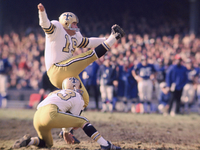Sixty-three yards from history with two seconds remaining on the clock, Tom Dempsey took on one of the NFL’s most enduring moments straight on.
Instantly recognizable as his right foot — which he kicked with — was without toes and enclosed in a modified shoe, Dempsey still employed the straight-toe style of kicking in the autumn of 1970.
With all his might, Dempsey took nary a pair of slight steps and booted a hopeful game-winner that fluttered to the ground 63 memorable yards later. On Nov. 8, 1970, Dempsey lifted a then-NFL record 63-yard field goal that sent the New Orleans Saints to a 19-17 triumph over the Detroit Lions and became an NFL moment that’s endured for generations.
Saturday night, at the age of 73, Dempsey died from complications from the novel coronavirus, the Saints announced.
“Our thoughts and prayers are extended to Carlene and the entire Dempsey family on the passing of their dear Tom,” Saints owner Gayle Benson said in a statement Sunday morning. “The New Orleans Saints family is deeply saddened and heartbroken at this most difficult time. Tom’s life spoke directly to the power of the human spirit and exemplified his resolute determination to not allow setbacks to impede following his dreams and aspirations. He exemplified the same fight and fortitude in recent years as he battled valiantly against illnesses but never wavered and kept his trademark sense of humor. He holds a special place in the hearts and minds of the Saints family.”
Having battled Alzheimer’s and dementia since 2013, Dempsey reportedly tested positive for COVID-19 last month. He returned to his assisted living facility recently, but his family put him in hospice care after his oxygen levels dropped on Wednesday, his daughter Ashley told NOLA.com.
Across 11 seasons, Dempsey found his way to playing for five teams — the Saints, Philadelphia Eagles (where he spent a career-long four campaigns), L.A. Rams, Houston Oilers and Buffalo Bills. It was for New Orleans that he began his NFL tenure and was most successful.
Hardly the prototype of a kicker, Dempsey was a defensive lineman at Palomar College in California. He was 6-foot-2, 255 pounds, a pudgy icon of the NFL’s past, having overcome birth defects that saw him born minus toes on his right foot and fingers on his right hand.
As a rookie with the Saints in 1969, Dempsey earned his initial and only Pro Bowl and All-Pro honors as he led the league with 41 field goal attempts (though he converted just 53.7 percent as it was a far different day in the NFL back then) and a long of 53 yards. It was the first of three seasons running in which Dempsey finished the year with the longest kick in the league — boots of the aforementioned 63 and a 54-yard strike for Philly following.
When Dempsey’s 63-yarder came and went it also was believed to be at the forefront of league rules changes as goal posts were moved in 1974 from the base of the end zone to behind it and the ball began to be awarded to the defense from the spot of where the ball was snapped — discouraging future long tries.
At the time of Dempsey’s immortal boot, it was a record by seven yards.
It wasn’t until 1984 that another NFL kicker even converted from 60 yards.
Now, Dempsey has been eclipsed by the Broncos‘ Matt Prater in 2013 (64 yards) and thrice tied by others.
Still, that kick all those decades ago lives on, fluttering through the Tulane Stadium air, broadcaster Al Wester’s call carrying it along.
“Dempsey kicks,” Wester bellowed. “It’s on the way … it is … good! It’s good! It’s good! The Saints have won! The Saints have won! The Saints have won! The stadium is wild. Dempsey is being mobbed. The time has run out, the Saints have won, 19 to 17. Dempsey with a 63-yard field goal. The longest field goal in the history of the national league!”
Though Dempsey’s kick has been surpassed in the record books, there’s no doubt it will live on as one of the NFL’s classic moments.
And just as the iconic kicker has passed on, there’s no doubt he’ll live on in the annals of NFL nostalgia and football fans’ fondest recollections of autumns past.
